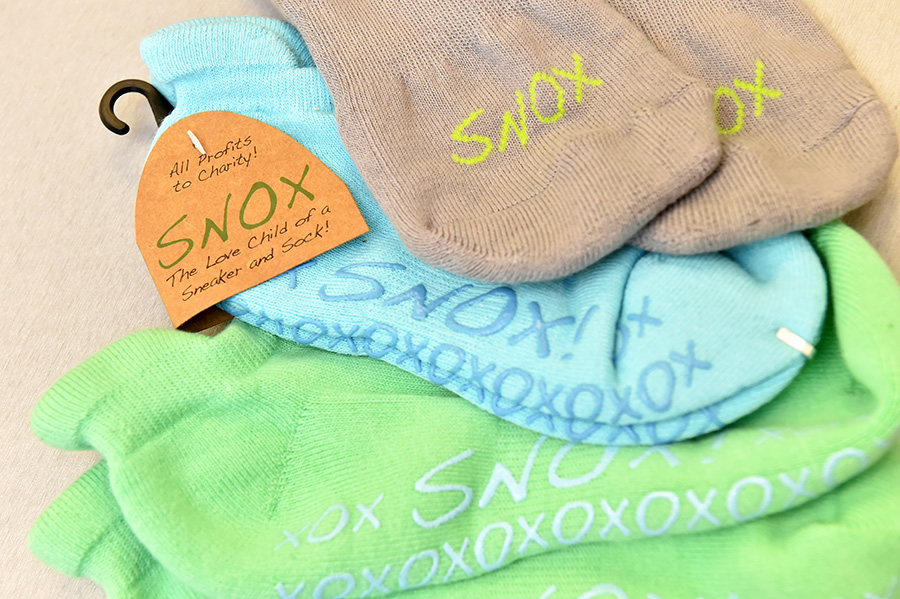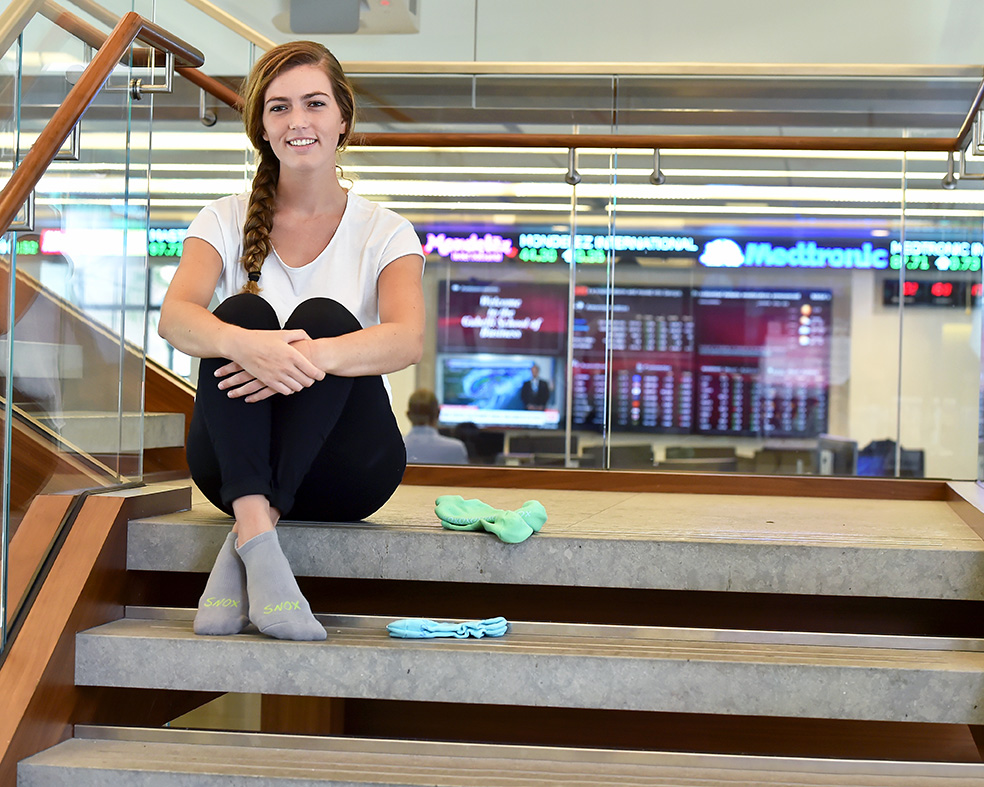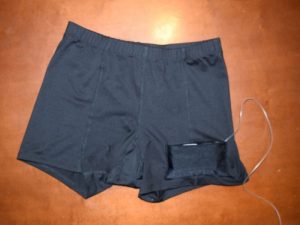Masterson, a sophomore marketing major at the Gabelli School of Business, is the creator and owner of SNOX, a company that sells non-slip, non-skid grip socks and donates 100 percent of profits to charity.
“The socks are similar to what they have in hospitals, but it’s also a product everyone can use,” said Masterson, a Rhode Island native. “They’re great for yoga or Pilates, wearing around the house, or just using as regular socks.”

The idea for SNOX came when at the age of 14 Masterson developed a four-inch blood clot in her arm. She was admitted to the hematology floor of the Children’s Hospital of Orange County (CHOC), California, where most of the other patients were battling blood cancers.
She vowed that when she got better she would find a way to give back to the hospital and its young patients.
With the encouragement of her parents, who are both entrepreneurs, Masterson opted to launch a company so that she could donate on a regular basis. She thought back to the non-slip (“really unattractive”) socks that the hospital issued to all of its patients, and decided to make a more child- and teenage-friendly version.
“My parents raised me to be socially conscious, and we always did a lot of volunteer work,” she said. “At the time, I didn’t need an income for myself—I babysat, and it’s not as though I needed for anything—so I decided to give 100 percent of the profits away.”
Since launching SNOX (the combination of “sneaker” and “sock”), Masterson has donated nearly $9,000 to charities including CHOC, Teach For America, Water Aid, Rotary International, Action Against Hunger, and Hope For the Warriors. She uses the website Charity Navigator to ensure that she donates to only the most reputable organizations.
Last year she was one of 15 freshmen fellows in Fordham’s chapter of Social Impact 360 (formerly the Compass Fellowship). She participated in the fellowship’s national competition in Washington, D.C. and won a national Kenneth Cole Foundation grant. The $2,500 grant has helped her boost her inventory for the upcoming Christmas season.

Photo by Dana Maxson
This year, she is mentoring younger Social Impact 360 fellows and was also accepted to the Fordham Foundry, where she will continue to learn about growing her company.
“Currently, the socks are made overseas and then shipped through Amazon, since I can’t really be shipping out of my dorm room,” she said. “But I would love to start manufacturing in the United States, which I couldn’t do at first because it would have spiked the cost of my socks. I would also like to come out with more styles.”
She is particularly looking forward to using what she’ll learn in her businesses classes this year to help expand SNOX further.
“I’m taking financial accounting, marketing, business communications—all of the basics,” she said. “I love the mentorship and my professors are amazing. I’m really excited to start this year off well.”
]]>But having a bulky contraption attached to her hip was cumbersome for an athlete like Logan. So, she did what any innovator would do: she made her own solution.

Logan, a rising junior at the Gabelli School of Business, is the founder of Pumpstash, LLC, a company that creates spandex shorts for women and girls with Type 1 diabetes who use an insulin pump and a continuous glucose monitor.
The shorts are fitted with pockets that keep the pump securely in place so that athletic apparel or skirts and dresses can be worn unimpeded.
The idea came to Logan while playing for her high school lacrosse team. During games and practice, her insulin pump would frequently get loose and bounce around.
“There were some options keep it attached, such as fanny packs or arm or thigh pouches—but nothing that would either stay in place or that me as a 16-year-old girl would be caught dead in,” said Logan, a business administration major with a minor in sustainable business. “I started to take it off during practice and games, but that wasn’t good for my numbers.”
Inspired by a pair of running pants that had a pocket to store keys, Logan wondered whether she could combine the sturdiness of her spandex lacrosse shorts with the convenience of a pocket.
She and her mom produced some sketches and took their design to a seamstress, who created the prototype. The Pumpstash shorts were born.
At Fordham, Logan took idea to the next level with a Compass Fellowship, a program to help first-year undergraduate students start a social venture. The following year she was accepted into the Fordham Foundry, which helped her turn her venture into her own company.Logan is raising money through a Kickstarter campaign to fund the manufacturing process and get Pumpstash shorts onto the market.
“The Foundry has been a huge help and support system,” she said. “It’s a great community, because everyone has their own thing and their own expertise, so we’re not competing against one another. Everyone wants everyone else to succeed.”
 The shorts are 79 percent polyester and 21 percent spandex and are made with antibacterial and wicking properties. A pocket in the back—which is made from a stronger material, 80 percent nylon and 20 percent spandex—keeps the pump secure, while a pocket in the front provides storage for ordinary objects such as keys or a cell phone. Ten percent of the profits from each pair sold is donated to the Juvenile Diabetes Research Foundation.
The shorts are 79 percent polyester and 21 percent spandex and are made with antibacterial and wicking properties. A pocket in the back—which is made from a stronger material, 80 percent nylon and 20 percent spandex—keeps the pump secure, while a pocket in the front provides storage for ordinary objects such as keys or a cell phone. Ten percent of the profits from each pair sold is donated to the Juvenile Diabetes Research Foundation.
It is important to continue funding research toward an eventual cure, Logan said. In the meantime, there are steps that can be taken to improve the quality of life for diabetics.
“Depending on how you look at it, I’m lucky or unlucky because I’ve never known life without it. It’s basically second nature to me,” she said. “But it can be really frustrating, especially if you’re in a situation that’s not a daily routine.”
Having that insider’s view of living with diabetes is at the heart of Pumpstash, Logan said, and is what drives her business model.
“It was important to me that this project be in the hands of someone dealing with [diabetes], rather than a bigger company. A big company isn’t necessarily thinking of little inconveniences that aren’t medically problematic but which could be fixed to make day-to-day life easier.”
]]>